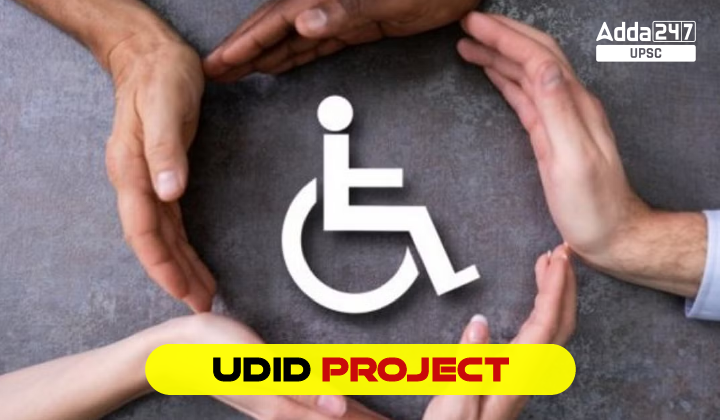Table of Contents
Full Form Of UDID
The full form of UDID is “Unique Disability ID.” The UDID is a distinctive identification number assigned to individuals with disabilities in India through the UDID Project. This initiative, launched by the Department of Empowerment of Persons with Disabilities (DEPwD) under the Ministry of Social Justice and Empowerment, aims to create a comprehensive and centralized database of persons with disabilities. The UDID serves as a unique identifier for individuals with disabilities, facilitating easy access to various benefits, services, and schemes designed to empower and support them.
What is the UDID Project?
The UDID Project, an initiative of the Ministry of Social Justice and Empowerment, is administered by the Department of Empowerment of Persons With Disabilities (DEPwD). Through the UDID Portal, the program aims to establish a platform for issuing Unique Disability ID Cards to all Persons with Disabilities (PwDs) and create a comprehensive National Database of individuals with disabilities in India.
Originally launched by the Government of India in 2016, the UDID Project became mandatory for all states and Union Territories (UTs) from June 1, 2021, as directed by the Ministry of Social Justice and Empowerment. Consequently, all states and UTs are now required to exclusively issue UDID Certificates through the UDID Portal. Before this mandate, different states independently issued disability certificates and maintained separate databases, resulting in a lack of uniformity in disability identification certificates.
Objectives of the UDID Project
The primary objectives of the UDID Project are:
- Identify all Persons with Disabilities (PwDs) across India.
- Issue uniform and unique Disability Identity cards through the UDID Portal.
- Establish a comprehensive national database for Persons with Disabilities (PwDs).
- Cover individuals previously documented with disabilities under the norms of the Rights of Persons Act of 2016, as well as those with new disabilities, by issuing Disability certificates to both categories.
- Improve the delivery of various benefits to Persons with Disabilities (PwDs), including Pension, Skill Training, Scholarships, Educational benefits,
- Rehabilitation, and concessions in services such as buses and railways.
- Ensure the accurate delivery of benefits to the correct beneficiaries at all levels of the implementation hierarchy, spanning National, State, District, Block, and Local levels.
- Formulate a comprehensive, uniform, and seamless system that issues ID cards containing disability information along with the identification of the beneficiary.
List of Disabilities Included in UDID Project
Following the enactment of the 2016 Right to Persons with Disabilities Act, the list of scheduled disabilities has expanded from 7 to 21. The UDID Project encompasses the following types of disabilities:
- Cerebral Palsy
- Low Vision
- Blindness
- Leprosy – Cured
- Locomotor Impairment
- Mental Illness
- Mental Retardation
- Hearing Impairment
Major Features of the UDID Project
- The UDID Portal is a unified web application accessible nationwide, facilitating online access to pertinent data concerning Persons with Disabilities (PwDs).
- It enables PwDs to apply for Universal Identity cards (Disability Certificates) by registering and submitting information online.
- Government institutions have the option to receive offline applications, which can be digitized through the Portal.
- Hospitals and Medical Boards employ efficient assessment procedures to determine the percentage of disability.
- The system ensures that there is no duplication of data related to Persons with Disabilities (PwDs).
- A Management Information System (MIS) reporting framework is employed for online data updates and corrections by PwDs.
- Functional management is achieved through the interoperability of government schemes and programs designed for the welfare of Persons with Disabilities (PwDs).
Importance and Benefits of UDID Card
- The Disability Card issued under the UDID Project will encompass all necessary and pertinent information about Persons with Disabilities (PwDs), eliminating the need for duplicate disability documents.
- This streamlined approach will simplify the process for PwDs to avail themselves of benefits from dedicated schemes and programs, enhancing their overall experience.
- UDID will serve as a singular, unique record for disabled individuals across India, eliminating the necessity for separate data records in different states.
- The data can be accessed and updated from any location in the country, leading to time and cost savings facilitated by the UDID Project.
- Implementation of schemes and programs for Persons with Disabilities (PwDs) will become more transparent, preventing the misuse of powers and reducing instances of corruption.
- The UDID card enables tracking the financial and health progress of beneficiaries at all levels of implementation, including the National, State, District, Block, and Local levels.
How to Download UDID Card?
- Persons with Disabilities (PwDs) are required to sign up and register on the UDID Portal.
- Upon successful registration, they must log in to apply for the UDID Card and Disability Certificate.
- Application options include requesting a new card, re-downloading an already issued card, or applying for card or certificate renewal.
- PwDs can locate their Chief Medical Officer (CMO) office or Medical Authority for disability assessment.
- The District Welfare Officer (DWO) will assist PwDs and provide information on various Government programs and schemes.
- The applied forms are received by the Medical Authority or CMO, who refer PwDs to a designated Medical Board or Specialist for assessment and verification.
- After assessment, details are submitted on the Portal, and the Medical Authority/CMO electronically issues the UDID Card and Disability Certificate.
- District Social Welfare Officers use the Portal to help PwDs obtain their cards and certificates, organise camps and provide application receiving counters.
- District Collectors monitor the effectiveness and efficiency of Government Programs for PwDs through the UDID Portal.
Need for UDID Project
According to the 2011 Census, India’s population includes 2.68 crore Persons with Disabilities (PwDs), representing slightly over 2% of the total population. However, comprehensive data on PwDs, including their details, types of disabilities, district-wise distribution, education levels, and employment status, is lacking.
Government assistance and benefits for PwDs are contingent on possessing a disability certificate. However, only approximately 50% of PwDs have obtained certificates from their respective states/UTs. The implementation of the Rights of Persons with Disabilities Act 2016 has increased the recognized disabilities from 7 to 21, broadening the scope of support and acknowledgement for PwDs.
Other Initiatives Towards Disabled People
- Rights of Persons With Disabilities Act 2016:
– Replaced the Disabilities Act of 1995, providing enhanced rights and protections for Persons with Disabilities (PwDs). - Accessible India Campaign (Sugamya Bharat Abhiyan):
– Launched on December 3, 2015, to establish a barrier-free environment nationwide for PwDs.
– Involves rating building designs and human resource practices on an accessibility index. - Deen Dayal Disabled Rehabilitation Scheme (DDRS):
– NGOs offering rehabilitation services for PwDs receive Grants in Aid from the Central Government.
– Aims to support efforts in achieving optimum functional levels for individuals. - ADIP Scheme (Assistance to Disabled People for Purchasing/Fitting of Aids/Appliances):
– Assists PwDs in acquiring modern aids and appliances, contributing to physical, psychological, and social rehabilitation.
– Aims to enhance income potential and promote self-dependence. - National Fellowship for Disabled Students:
– Implemented by UGC, supports selected M.Phil./Ph.D. students with disabilities in their research work.
– Ensures equal educational opportunities for disabled students. - DRC (District Rehabilitation Centre) Scheme:
– Aims to establish District Rehabilitation Centres across all districts in India.
– Offers tailored rehabilitation services to meet the needs of PwDs in rural areas.
Through these initiatives and schemes, the Government is actively working to empower and support Persons with Disabilities in various aspects of their lives, including education, accessibility, rehabilitation, and overall well-being.
Conclusion
The UDID Project holds considerable potential to contribute to India’s Digital India objectives by streamlining the application process for Disability Cards and Certificates for Persons with Disabilities (PwDs). However, to achieve universal application, several challenges such as low awareness, elevated rejection rates, and substantial pending applications need to be addressed.
At the district level, where responsibilities are numerous and resources are limited, there is a need for enhanced implementation of the UDID Project. To bolster this, it is crucial for state and Central Governments to provide adequate infrastructural and financial support. This support will play a pivotal role in ensuring the efficient and effective implementation of the UDID Project across districts.




 TSPSC Group 1 Question Paper 2024, Downl...
TSPSC Group 1 Question Paper 2024, Downl...
 TSPSC Group 1 Answer key 2024 Out, Downl...
TSPSC Group 1 Answer key 2024 Out, Downl...
 UPSC Prelims 2024 Question Paper, Downlo...
UPSC Prelims 2024 Question Paper, Downlo...





